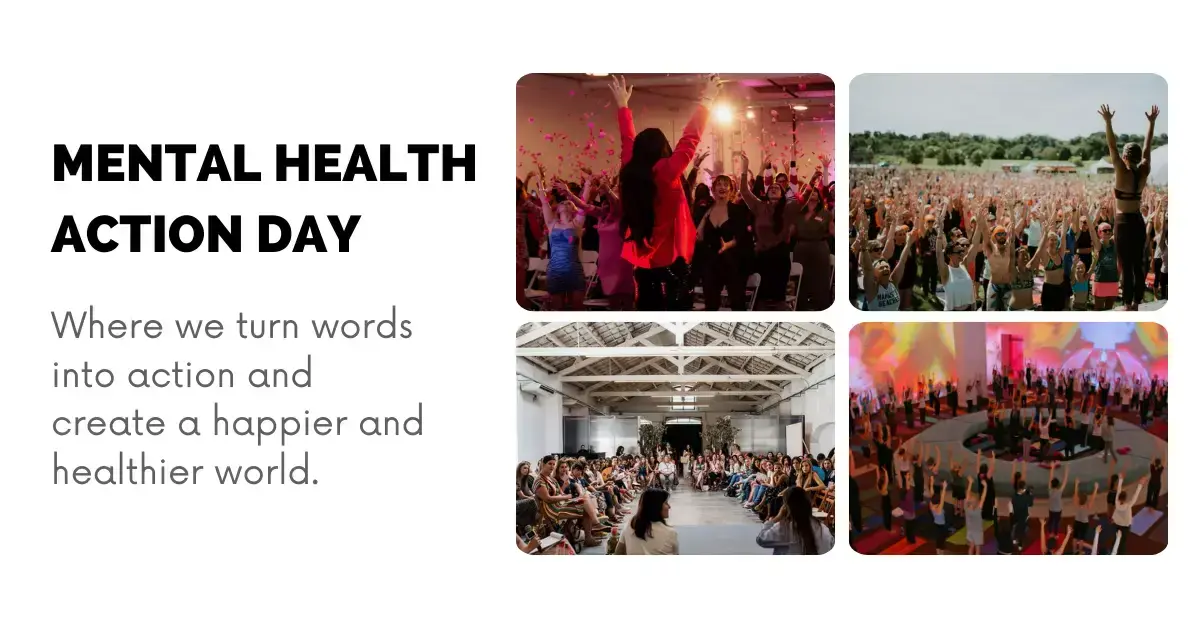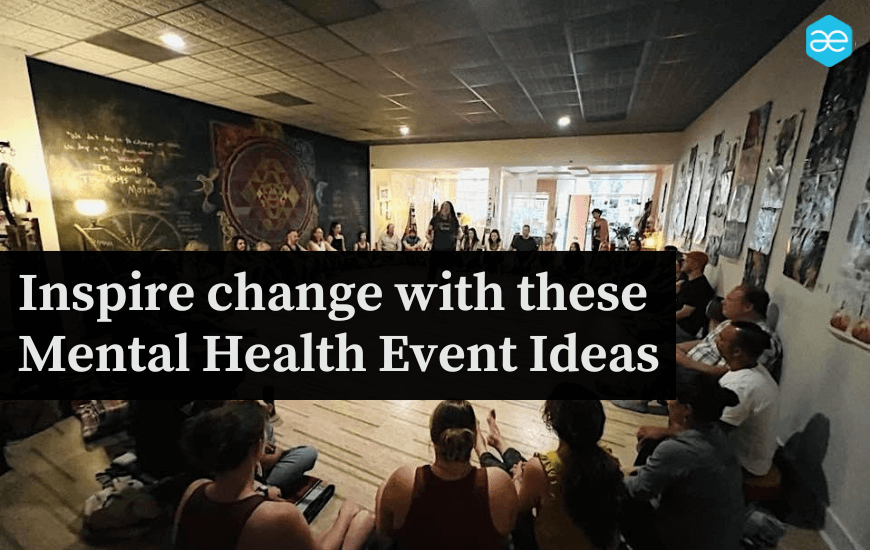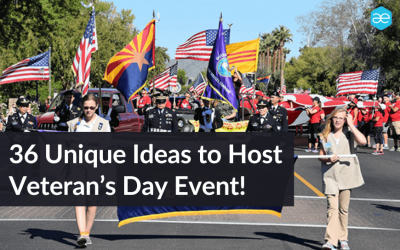What if your event could spark the change right now? From stress-reducing workshops to laughter-filled yoga sessions, multiple event types are there to whisper, “We have time to listen to you.”
So, how about exploring 21 heartfelt mental health event ideas to cultivate understanding and support for mental health? Sometimes, a little inspiration is all we need.
Here are some of the best mental health event ideas to host next:
1. Mental health panel and workshop series
Unique selling proposition (USP) of the event
Set your Mental Health Panel and Workshop Series apart by offering diverse speakers and topics covering the spectrum. Unlike standalone events, this event series provides attendees with an understanding of mental wellness.
These events can also be good ideas for college events and can work best in psychology institutes.
University Health Services provides virtual and in-person workshops on various dates, such as “Conquering Exams” and “Imposter Phenomenon,” which focus on managing stress and developing study strategies.
Things to take care of
Curate a balanced program with topics that appeal to a broad audience. Do not niche down, at least in the first event. Instead, choose a broader spectrum and address various aspects of mental health, such as stress management, self-care, and resilience.
Ensure clear communication about each session’s schedule, format, and registration process to maximize attendance and engagement.
You may also like to read: Creative Workshop Ideas That Are Going To Work In 2024.
2. Host mental health action day

Unique selling proposition (USP) of the event
When organizing this mental health event, focus on creating an atmosphere of unity and empowerment. This day is about rallying together to raise awareness about mental health issues. Highlight the opportunity for attendees to be part of a more significant movement.
By participating, attendees contribute to a larger conversation and movement surrounding mental health advocacy.
You can take inspiration from Mental Health Action Day events.
Things to take care of
Choose a venue that reflects the inclusive and supportive nature of the event, ensuring accessibility for all attendees.
Collaborate with community organizations and local leaders to maximize outreach and engagement.
Plan interactive activities, speakers, or workshops to encourage participation and facilitate meaningful dialogue and action.
Must provide resources and support for attendees to continue their advocacy efforts beyond the event, such as information on local support groups or mental health organizations.
3. Outdoor mental wellness activities

Unique selling proposition (USP) of the event
When organizing Outdoor Mental Wellness Activities, focus on harnessing nature’s healing power to promote relaxation, connection, and well-being. Unlike indoor events, outdoor activities offer a refreshing change of scenery and allow participants to unplug, recharge, and reconnect with themselves and others.
Here’s a detailed look at each of the activities listed for this mental health event ideas:
1. Nature Walks or Hikes
2. Forest Bathing (Shinrin-Yoku)
3. Beach or Park Yoga
4. Community Gardening
5. Outdoor Mindfulness or Meditation Sessions
Things to take care of
Choose outdoor locations that are easily accessible and offer a variety of activities suitable for participants of all ages and abilities.
When planning outdoor activities, consider weather, safety, and accessibility to ensure a positive experience for all attendees.
Provide amenities such as water stations, sunscreen, and restroom facilities to ensure the comfort and well-being of participants.
4. Host a stress-reduction workshop

Unique selling proposition (USP) of the event
When planning your Stress-Reduction Workshop, focus on making attendees feel supported. Emphasize the practical strategies and techniques participants will learn to manage stress and improve their overall quality of life.
The workshop provides a valuable opportunity for attendees to connect with others experiencing similar stressors, fostering a sense of community and support.
By investing in their mental health, participants will experience increased resilience and overall well-being.
Things to take care of
Incorporate various stress-reduction techniques, such as mindfulness and guided relaxation exercises.
Consider offering follow-up sessions or resources to support attendees in maintaining their stress-reduction practices over time.
Note: Remember to prioritize yourself as the organizer, prioritizing your mental well-being throughout the workshop’s planning and execution. ⭐
5. Host a mental health seminar

Unique selling proposition (USP) of the event
When planning your Mental Health Seminar, focus on providing interactive discussions and personalized advice from seasoned professionals. Unlike traditional lectures, this approach creates a dynamic and engaging experience for attendees, increasing their likelihood of participation and retention of key information.
Topics you can conduct a mental health seminar on
1. Understanding Anxiety and Depression
This topic could involve exploring the nature of anxiety and depression, including their prevalence, impact on daily living, and the importance of early detection and intervention.
2. Mindfulness and Meditation Techniques
It might include demonstrations of various mindfulness-based interventions (MBIs), such as Mindfulness-Based Stress Reduction (MBSR) and Mindfulness-Based Cognitive Therapy (MBCT), which have shown efficacy in reducing anxiety and depression symptom severity.
3. Building Resilience and Coping Strategies
This topic could address the role of resilience in mental health, including how individuals can develop coping strategies to navigate life challenges.
4. The Impact of Mindfulness
This session could evaluate the broader implications of mindfulness practices on mental health, including its integration into mainstream medical and psychological therapies.
Things to take care of
Ensure that the venue is conducive to group discussions and activities, with sufficient seating and audiovisual equipment for presentations.
Select knowledgeable and engaging speakers who can connect with the audience and deliver valuable insights.
Promote the event effectively to attract attendees and encourage early registration to manage seating capacity.
6. Exercise together workshop

Unique selling proposition (USP) of the event
Make your Exercise Together Workshop stand out by emphasizing the power of community and support in achieving fitness goals. Unlike solo workouts, this workshop brings people together to sweat, laugh, and encourage each other, making exercise feel more like fun than a chore.
Things to take care of
Choose exercises accessible to participants of all fitness levels and can be modified to accommodate individual needs and preferences.
Create a welcoming and inclusive environment where everyone feels comfortable and encouraged to participate at their own pace.
Provide clear instructions and demonstrations for each exercise, ensuring participants feel confident and safe throughout the workshop.
7. Group meditation event

Unique selling proposition (USP) of the event
Set your Group Meditation Event apart by highlighting the power of collective meditation to foster inner peace and connection. Unlike meditating alone, this event offers a supportive environment where participants can share the experience and amplify the benefits of meditation through group energy.
Things to take care of
Choose a quiet and comfortable venue where participants can relax and unwind without distractions.
Provide guidance and instruction on meditation techniques, breathing exercises, and mindfulness practices to support participants throughout the event.
Create a peaceful and inviting atmosphere with soft lighting, comfortable seating, and soothing music or nature sounds.
Encourage participants to arrive a few minutes early to settle in and prepare for the meditation session.
8. Mindfulness activity campaigns

Unique selling proposition (USP) of the event
Elevate your Mindfulness Activity Campaigns by highlighting the transformative power of mindfulness in everyday life. Unlike traditional campaigns, this event offers practical and accessible mindfulness activities that empower participants to cultivate presence, resilience, and well-being.
Mindfulness campaigns and events can be a fantastic way to introduce people to the practice and its benefits. Here are some creative mindfulness activity campaign ideas:
1. Mindful Minute Mondays: Encourage social media posts or flyers with a daily mindfulness activity (e.g., focusing on your breath for 60 seconds).
2. Tech-Free Tuesdays: Promote digital detox tips and encourage participants to disconnect from devices for a day.
3. Walking Wednesdays: Organize group walks during lunch breaks or after work to promote mindful movement.
4. Photo/Video Challenges: Host a contest on social media where participants share photos or videos of their daily mindfulness practice (e.g., mindful nature walk, mindful coloring).
Things to take care of
Offer a variety of mindfulness activities, such as guided meditation, mindful movement, and gratitude practices, that cater to different preferences and needs.
Provide clear instructions and guidance for each activity, ensuring participants feel comfortable and confident in their practice.
Create a supportive and inclusive environment where participants feel encouraged to explore and experiment with mindfulness.
9. Self-compassion workshop

Unique selling proposition (USP) of the event
Elevate your Self-Compassion Workshop by emphasizing the importance of kindness and understanding towards oneself. Unlike typical workshops, this event offers practical tools and techniques to cultivate self-compassion, empowering participants to embrace their imperfections and foster inner peace.
Things to take care of
Create a warm and welcoming environment where participants feel comfortable sharing their experiences and exploring their emotions.
Structure the workshop with guided exercises, group discussions, and self-reflection activities to cater to different learning styles and preferences.
Encourage participants to approach the workshop with an open mind and curiosity, allowing them to explore and learn without judgment.
10. Laughter yoga session

Unique selling proposition (USP) of the event
Distinguish your Laughter Yoga Session by highlighting the joy and connection that laughter brings to our lives. Unlike traditional yoga classes, this event offers a lighthearted and playful approach to wellness, combining laughter exercises with simple yoga-inspired movements for a fun and uplifting experience.
Here are some creative examples to get your giggle session started:
Warm-Up Activities (5-10 minutes):
Greeting with Laughter: Start with a simple greeting like “Namaste” but with a forced, exaggerated laugh at the end. This creates a light and playful atmosphere.
Stretching with Smiles: Engage in gentle stretches while incorporating laughter sounds like “ho ho ha” or playful animal noises.
Laughter Exercises (20-30 minutes):
Mirror Laughter: Participants stand in pairs, facing each other. One person initiates a funny facial expression or movement, and the other mirrors it while laughing. Switch roles frequently.
Fake Laugh: For 30 seconds, everyone practices fake laughter, gradually increasing the intensity and volume. This can trick the body into real laughter.
Clapping and Chanting: Clap hands rhythmically while chanting playful sounds like “ho ho ha ha” or “ha ha hee.”
Energy Boosters (10-15 minutes):
Life Situation Mimicry: Act out funny scenarios like a tea party gone wrong or a cat stuck in a tree. Everyone participates with laughter and sound effects.
Laughing Yoga Games: Play simple games like “Simon Says” with a twist – if someone forgets the instruction, they erupt in laughter instead of doing push-ups.
Cool-Down (5-10 minutes):
Breathing Exercises: Practice deep breathing exercises to return to a calm state.
Sharing and Reflection: Briefly share how the session felt and encourage participants to carry the laughter throughout their day.
Things to take care of
Choose a spacious and comfortable venue where participants can move and laugh freely without feeling inhibited.
Encourage participants to wear comfortable clothing and bring a water bottle to stay hydrated throughout the session.
Create a welcoming and inclusive atmosphere where participants feel encouraged to let loose and embrace their inner child.
11. Expressive dance therapy

Unique selling proposition (USP) of the event
Make your Expressive Dance Therapy session stand out by highlighting the power of movement and expression to promote emotional healing and well-being. Unlike traditional therapy sessions, this event offers a creative and dynamic approach to self-discovery and healing through dance and movement.
Things to take care of
Choose a spacious and comfortable venue with ample room for participants to move freely and express themselves without inhibition.
Create a non-judgmental and inclusive atmosphere where participants feel encouraged to explore and express their emotions through dance and movement.
Provide guidance and support throughout the session to help participants connect with their bodies and emotions in a safe and supportive way.
Want to draw a crowd that genuinely wants to be part of your mental health event? List your event on AllEvents, where attendees are waiting to hit that register button!

A quick recap on mental health event ideas
Now that you’ve discovered these fantastic mental health event ideas, it’s time to take action and inspire change in your community.
Whether you’re hosting a stress-reducing workshop or a mindfulness activity campaign, each event can make a difference in someone’s life.
So, spread kindness, spark conversation, and make the world happier and healthier, one event at a time!






